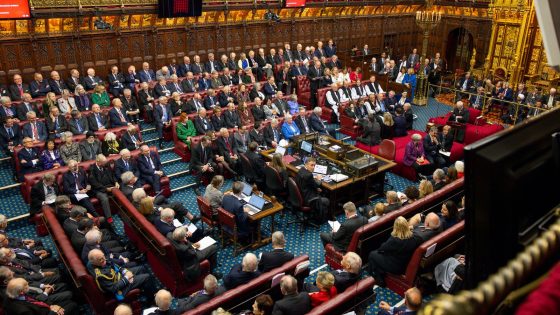The House of Lords has pushed the government’s Rwanda Bill back to the Commons again as a row continues over the controversial plan to “stop the boats”.
Prime Minister Rishi Sunak told reporters on Monday that “enough is enough”, promising the legislation – which aims to see asylum seekers making Channel crossings deported to the African nation – would pass its final parliamentary stages this evening, “no matter how late it goes”.
But peers are now testing this pledge, insisting MPs take another look at one of the changes they want implemented to the bill for the fifth time – namely the mechanism of how Rwanda is declared as a “safe country”.
Politics live: Follow the latest from parliament as MPs and peers vote on Rwanda bill
Speaking in the Commons after the bill returned – shortly after 10pm – illegal migration minister Michael Tomlinson said there was “nothing new” in what the Lords had said, and called for the final amendment to be scrapped.
But Labour’s shadow immigration minister, Stephen Kinnock, condemned the government for “ferociously attacking” peers “simply for doing their constitutional duty”.
Ministers did make a concession earlier on Labour peer Lord Browne’s proposal that sought to ensure asylum seekers who had worked with British armed forces abroad were not deported, which stopped him pushing for the amendment to be looked at again by MPs.
The government promised to reassess all those from Afghanistan whose claims had been rejected under the Afghan Relocations and Assistance Policy (ARAP) scheme, with Home Office minister Lord Sharpe saying: “The government recognises the commitment and responsibility that comes with combat veterans, whether our own or those who have shared courage by serving alongside us, and we will not let them down.”
But there was no compromise on offer for Lord Hope’s amendment, which would require an independent body to rule Rwanda as safe, rather than just declaring it in law – and peers backed his call by 240 votes to 211.
Crossbencher Lord Anderson, who was representing his colleague in the debate, said: “In a less frenetic political environment, this common sense amendment or something very like it could, I am sure, have been hammered out between sensible people around a table.
“Sadly, that does not appear to be the world that we are in.”
The peer’s proposal is likely to be rejected by MPs – unless ministers make a further concession – as the Conservatives have a solid majority.
It will then return to the Lords for a second time later tonight, where peers will have to decide whether to dig their heels in once more, or finally give their approval to the bill.
Both Houses will need to agree to the legislation before it can become law, and voting could continue into the early hours of Tuesday morning before a conclusion is reached.
The Rwanda plan, first announced by Boris Johnson two years ago, has seen millions already paid to the country to set up facilities to house asylum seekers, but no one has been sent there yet.
However, Mr Sunak insisted that after it became law, the first flights would take off in 10 to 12 weeks, and would then act as a deterrent against people making the dangerous journey in small boats.
The prime minister blamed Labour peers for the delays, following multiple rounds of so-called “ping pong” between the two Houses.
But he has faced trouble from his own side too, with Tory MPs on the right insisting the law won’t be tough enough, and more centrist Conservative peers criticising its methods.
The scheme has also faced legal hurdles, with the UK’s Supreme Court ruling it unlawful last November.
But the prime minister believes his changes to the legislation – which include stating in law that Rwanda is a “safe country” and introducing a treaty with the nation – will ensure its future.
Source Agencies




